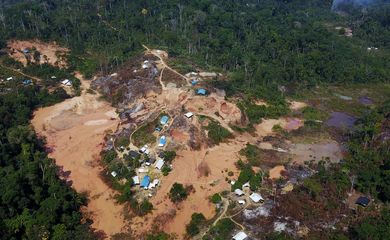“The water is sick”: Yanomami denounce river contamination

“The water is sick everywhere across the land.” Those were the words used by indigenous leader Júnior Hekurari Yanomami to describe just one of the aspects of his people’s predicament: the lack of drinking water in western Roraima and northern Amazonas, in North Brazil.

Júnior Yanomami—who is also chair of the Yanomami and Yek’uana Indigenous Health District Council—explained that the water bodies in Yanomami lands are contaminated by heavy metals used in illegal gold extraction. Scarce water, he noted, is a serious problem facing the indigenous people at this time.
“Water is vital for the life in the communities. And there’s no water, as we see. It’s all contaminated. There’s only mud. We’ve been talking about food provisions, but we also need a water supply system for the communities,” he said.
On a visit to the Surucucu region last week, our reporting team came across indigenous people asking for clean water. “It’s a lot of dirty water. We drink and our stomachs hurt,” said Ivo Yanomami, leader of the Xirimifik community.
The government must create an urgent project to assist the villages, Júnior Yanomami argued. “The water should reach the communities. There are many of them, and nowhere to get the water from,” he remarked. “The water needs to be healed. The communities need to be healed.”
Research foundation Fiocruz has identified ties between malnutrition and the consumption of water in inadequate conditions in two Yanomami villages in Amazonas. The researchers are now looking for ways to provide drinking water to these people.
In a statement, the Ministry of Development and Welfare, Family, and Fight against Hunger report that “technicians are considering the best method and technology for water storage in the region. The solution must efficiently address their needs and respect the knowledge and customs of the Yanomami people.”






